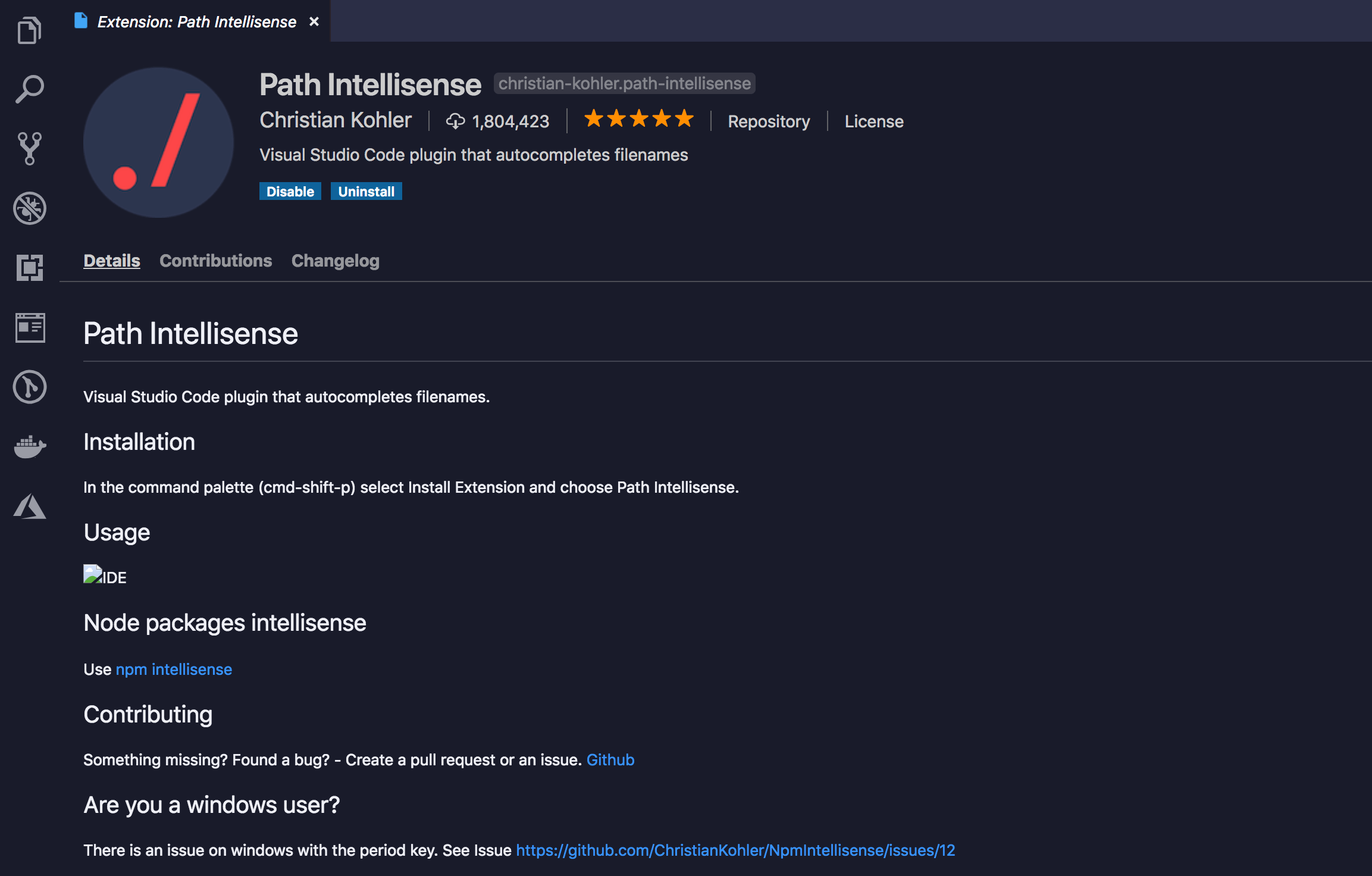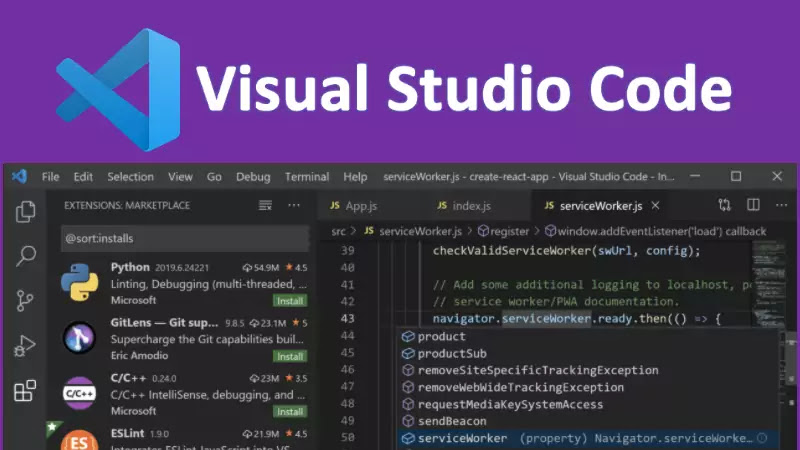DeepScan provides a Visual Studio Code extension enabling on-the-fly analysis for JavaScript and TypeScript in development.
Overview
DeepScan's extension for Visual Studio Code helps you to see bugs and quality issues on the fly in your Visual Studio Code.
- Report issues in Problems panel when you open or save a JavaScript/TypeScript file and save it. Supported extensions are
*.js,*.jsx,*.mjs,*.ts,*.tsx, and*.vue. - Highlight issues in the code.
- Show a rule description using a code action. When you click the light bulb of the issue, you can see the detailed description of the rule and grasp what's the problem.
ESLint fixes are syntax-aware so you won't experience errors introduced by traditional find-and-replace algorithms. Preprocess code, use custom parsers, and write your own rules that work alongside ESLint's built-in rules. You can customize ESLint. Loss of eslint-plugin integration for Visual Studio Code #326. Closed jzilg opened this issue Feb 28, 2019 10 comments Closed Loss of eslint-plugin integration for Visual Studio Code #326. Jzilg opened this issue Feb 28, 2019 10 comments Labels. Package: parser triage. Copy link Quote reply.
You can browse it in the Visual Studio Code Marketplace and install from within Visual Studio Code.
It's free and open source.
Considerations
Yes, it's free but note that:
Free version transfers the code to the DeepScan server for inspection when you save your changes.
Although your code is completely deleted from the server right after the inspection, you should confirm that your code is transferred to the DeepScan server.
You can confirm it by pressing the Confirm button that appears when restarting VS Code after the installation.

If you want to analyze without DeepScan server, check here.
Options
You can configure options (enablement, server, ignored rules, ..) through user and workspace settings.
To see all the available options, refer to Settings Options.
Features

Disabling Rules with Inline Comments
While you can exclude project-wide rules via deepscan.ignoreRules option, you can also disable a rule in a file using inline comment.
By Ignore this line and Ignore this rule code actions, you can add an inline comment easier.
For detailed information, refer to Disabling rules.
Viewing Rule Information

For a detected issue, you can view the corresponding rule information such as severity, description, non-compliant and compliant examples.
When you click Show rule <rule name> code action menu in the line where the issue is detected, you can view the detailed information of the rule on the right side.
Embedded Mode
Our Visual Studio Code extension has the limitation for transferring the file to the DeepScan server and analyzing a file one by one.
DeepScan supports an embedded mode, which works standalone without the DeepScan server. It works with the local language server so you can:
- never worry about transferring the code outside.
- analyze a whole project rather than a file.
System Requirements
JavaTo run the DeepScan server, Java is required.
- Oracle JRE 8 and above
- OpenJDK 8 and above
The path to a Java executable must be set in PATH environment variable. Otherwise, you will not be able to run the DeepScan server. (resulting an error such as Cannot start the DeepScan server.)
Also, the DeepScan extension 1.7.0 or above is required for the embedded mode. (The latest is recommended, so either set up to auto-update or check whether there is the latest update before setting up this.)
Installation
To run as the embedded mode, the following settings are required:

- Server Embedded: Enable: Controls whether DeepScan inspection should be executed via the embedded server rather than DeepScan server. (Restart required)
- Server Embedded: License: Configures the license for the embedded analysis.
- Server Embedded: Server Jar: Configures the JAR file for the embedded server. (Restart required)
To install, complete the above settings and restart VS Code.
To upgrade, change deepscan.serverEmbedded.serverJar to the path of a newer JAR file and restart VS Code.
Analysis Target
For detailed information about the analysis target, refer to the following:
Inspect Project
You can analyze a whole project by clicking DeepScan: Inspect Project in the command palette. The entire project is analyzed and the detected issues are displayed in Problems view.
You can specify patterns of files to exclude by deepscan.ignorePatterns option (gitignore format). An example to exclude App.vue file and lib directory is:
ESLint Analysis
Run ESLint. You can see the ESLint alarms altogether with DeepScan's issues.

Node.js and eslint package are required in the local or global. Note that NODE_PATH environment variable is necessary to load the eslint module installed in global.
It directly uses the package so your custom configurations and plugins are applied as is.
The options are as follows:
- Server Embedded > Eslint: Enable: Controls whether ESLint analysis should be executed.
- Server Embedded > Eslint: Merge: Option for how identical issues of DeepScan and ESLint are merged. Default is
deepscan.deepscan: Show only DeepScan issue (e.g.,BAD_TYPEOF_COMPARISON). Default.eslint: Show only ESLint issue (e.g.,valid-type-of)both: Show all issues as is (e.g.,BAD_TYPEOF_COMPARISONandvalid-type-of)
What is ESLint?
ESLint is a tool which allows us to write clean, optimized, organized & valid JavaScript code by following a set of rules or coding guidelines. Best paintbrush for acrylic paint.
ESLint has already been integrated in Visual Studio 2017 by Microsoft. You can enable or disable it as per your project requirement.
Enable or disable ESLint in Visual Studio 2017
Configure Eslint Visual Studio 2019
To enable it, you can go to Tools > Options > Text Editor > JavaScript/TypeScript > ESLint
ESLint follows rules from a file named .eslintrc which you can find on below location. You can also modify this file and change rules as per your project requirement.
Turn Off Eslint Vs Code
ESLint in Visual Studio works whenever you open or save any javascript file. It will also show your errors, warnings & information in ErrorList pane. See below image.
Install Eslint Visual Studio 2019
